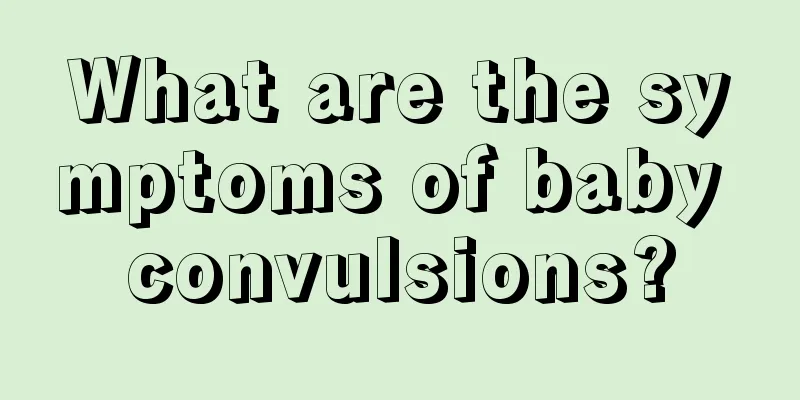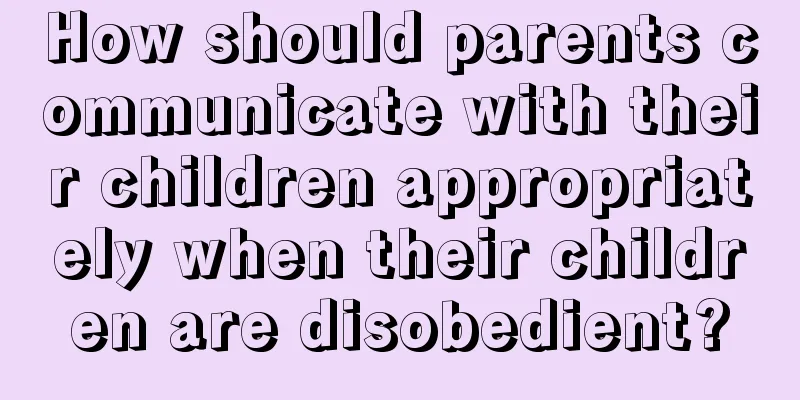What are the symptoms of baby convulsions?

|
A healthy baby has no abnormal symptoms, but after becoming ill, he will experience many abnormal discomforts, such as convulsions. What are the symptoms of baby convulsions? After becoming ill, you will find that the baby's eyes are out of focus, and the limbs have abnormal symptoms of convulsions. In severe cases, there will be abnormal breathing. This symptom is caused by the disease. We must observe the baby's body. When convulsions are found, we must observe the disease in the body to prevent symptoms caused by the disease. Let's explain in detail below. When the baby is convulsing, his eyes are fixed, his eyeballs are trembling, local muscles on his face are twitching, or his limbs are twitching irregularly. Some symptoms only include pale or flushed face, sweating, irregular breathing; or breath holding, apnea, and cyanosis of the skin. There are many diseases that can cause this symptom, such as: Intracranial hemorrhage and brain tissue hypoxia caused by neonatal asphyxia are the most common causes of neonatal convulsions. It usually occurs within 12 days after birth, and survivors may develop epilepsy, hemiplegia, low IQ, hydrocephalus, etc. in the future. A baby's fever and convulsions are medically called "febrile convulsions". This is mainly due to the imperfect development of the infant's nervous system, such as poor inhibitory function of the cerebral cortex and incomplete formation of the nerve myelin sheath. Once stimulated by external stimuli, the excitement can easily spread and cause convulsions. Generally speaking, infants and young children between 6 months and 4 years old, especially those who often catch colds and fevers, are more likely to suffer from febrile convulsions. Convulsions usually occur when the baby has a high fever, such as a body temperature of 39℃-40℃, and last for a relatively short time, about 2-3 minutes, and generally do not exceed 10 minutes. After the convulsion stopped, the child woke up. Some patients suffer from convulsions caused by calcium deficiency. Calcium is one of the most important nutrients for the human body. It can help bone development, strengthen muscles, and is also indispensable to the nervous system and heart. Calcium supplementation is one of the most important courses in infancy and childhood. If the baby lacks calcium, many problems will occur in the body. Less outdoor activities and less sun exposure may cause insufficient calcium absorption and lead to calcium deficiency in babies. Babies who are calcium deficient may experience convulsions in the limbs, irritability, crying, restless sleep, easy waking, easy startling, excessive sweating, hair loss on the back of the head, and delayed teething. If a newborn baby has convulsions, parents must remain calm and not rock the convulsing baby in their arms, as vibrations will aggravate the convulsions. The child should be laid flat on the bed as soon as possible, lying down, keeping the child's airway open, with the head tilted to one side to prevent vomitus from being inhaled into the trachea. Pressing the Ren Zhong and Hegu points of the child with your thumb has a certain effect. After the convulsions stopped, the patient was sent to the hospital for further examination and treatment. If the convulsion continues, go to the hospital for treatment immediately. What are the symptoms of baby convulsions? When a baby has this symptom, the characteristics are very obvious, and parents can easily discover that the baby is unwell. When parents are unable to make a judgment, it is best to go to the hospital for examination. Through examination, they can diagnose the disease causing the problem and develop an effective treatment plan. A baby's physique develops from weak to strong, which is related to his usual diet, living habits, etc. In order to ensure the baby's healthy growth, we should do a good job of care in all aspects. |
<<: What is the most nutritious food for babies?
>>: Treatment of anemia in babies
Recommend
What is the reason why children often blink?
Blinking is an instinctive action of human beings...
Is it good to bathe your baby frequently?
Many mothers think that they want to bathe their ...
Why does my child drool so much?
Many children will drool at certain times. Every ...
What causes joint pain in children?
Many parents are a little surprised, because join...
What to do if a boy often has nosebleeds
Children are very lively and active, especially b...
What should I do if my child wakes up coughing in the morning?
It is very normal for children to cough in daily ...
At what age do babies start talking?
The process from the birth of a child to the time...
Six foods to help children protect their eyesight during summer vacation
During the summer vacation, our children are undi...
How does the fetus die from the induction of labor?
We all know that for older fetuses, induction of ...
Can children's allergies cause fever?
In fact, most cases of allergies will not cause f...
Why do children’s teeth turn black?
Friends who smoke frequently will have yellow tee...
What should I do if my child has flat feet?
Every child is brought into this world holding th...
What should you teach your one-year-old baby?
Nowadays, parents pay special attention to their ...
Things to pay attention to when your child wakes up at night
For children, they should have a relatively peace...
What should I do if my child is frightened and has a fever?
Because children are unfamiliar with things in th...









